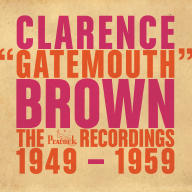Brown learned the value of versatility while growing up in Orange, TX. His dad was a locally popular musician who specialized in country, Cajun, and bluegrass -- but not blues. Later, Gate was entranced by the big bands of Count Basie, Lionel Hampton, and Duke Ellington (a torrid arrangement of Take the 'A' Train remains a centerpiece of Brown's repertoire). Tagged with the "Gatemouth" handle by a high school instructor who accused Brown of having a "voice like a gate," Brown has used it to his advantage throughout his illustrious career. (His guitar-wielding brother, James Widemouth Brown, recorded Boogie Woogie Nighthawk for Jax in 1951.)
In 1947, Gate's impromptu fill-in for an ailing T-Bone Walker at Houston entrepreneur Don Robey's Bronze Peacock nightclub convinced Robey to assume control of Brown's career. After two singles for Aladdin stiffed, Robey inaugurated his own Peacock label in 1949 to showcase Brown's blistering riffs, which proved influential to a legion of Houston string-benders (Albert Collins, Johnny Copeland, Johnny Guitar Watson, Cal Green, and many more have pledged allegiance to Brown's riffs). Peacock and its sister label Duke prospered through the '50s and '60s.
Gate stayed with Peacock through 1960. The RB charts didn't reflect Brown's importance (he hit only once nationwide with 1949's two-sided smash Mary Is Fine/My Time Is Expensive). But his blazing instrumentals (Boogie Uproar, Gate Walks to Board, 1954's seminal Okie Dokie Stomp), horn-enriched rockers (She Walked Right In, Rock My Blues Away), and lowdown Lone Star blues (Dirty Work at the Crossroads) are a major component of the rich Texas postwar blues legacy. Brown broke new ground often -- even in the '50s, he insisted on sawing his fiddle at live performances, although Robey wasn't interested in capturing Gate's violin talent until Just Before Dawn (his final Peacock platter in 1959).
The '60s weren't all that kind to Brown. His cover of Little Jimmy Dickens' country novelty May the Bird of Paradise Fly Up Your Nose for tiny Hermitage Records made a little noise in 1965 (and presaged things to come stylistically). But the decade was chiefly memorable for Brown's 1966 stint as house bandleader for #The!!!!Beat, a groundbreaking syndicated RB television program out of Dallas hosted by WLAC DJ Bill Hoss Allen.
When Gate began to rebuild his career in the '70s, he was determined to do things his way. Country, jazz, even calypso now played a prominent role in his concerts; he became as likely to launch into an old-time fiddle hoedown as a swinging guitar blues. He turned up on #Hee Haw with pickin' and grinnin' pal Roy Clark after they cut a sizzling 1979 duet album for MCA, Makin' Music. Acclaimed discs for Rounder, Alligator, Verve, and Blue Thumb in the '80s, '90s, and 2000s have proven that Gatemouth Brown is a steadfastly unclassifiable American original. Gatemouth Brown passed away on September 10, 2005 in Orange, TX. ~ Bill Dahl, Rovi













